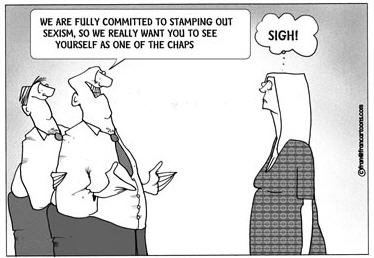What is sexism?
Sexism is the unjust or prejudicial treatment on the basis of sex or gender. In modern society, this often originates with men, and is directed at women. In simming, this manifests as male characters treating female characters in ways that devalue their skills or abilities – generally “less than.”
Why is this important?
“Infinite Diversity in Infinite Combinations” (IDIC) is the core of Vulcan philosophy and is one of the fundamental beliefs of the Star Trek universe as a whole. Our community seeks to embrace all of the infinite combinations that both writers and characters bring to the group, and celebrate the worth and diversity of our members – but, while we may play our game in the utopia of Star Trek’s future, the unfortunate truth is that the twenty-first century in which we live is not always so enlightened. Because of that, we must be educated about, recognize, and refrain from engaging in sexist behaviors because they can hurt our fellow writers and make them feel belittled.
We challenge our members to think beyond the limitations of the twenty-first century and write their characters in a way that doesn’t create a hostile simming environment for others.
Discrimination is an important part of fiction
Science Fiction plays a unique role in fiction. It allows us to talk about, and examine, contemporary social issues from a different perspective, removing the viewer or the reader from their preconceived notions about a problem to make them think about our society and our behaviors in a different way.
Star Trek is particularly good at this type of social commentary. Consider The Original Series episode “Let That Be Your Last Battlefield,” in which a fugitive seeks to escape his pursuer. The fugitive’s face is colored black and white, while his pursuer’s face is colored white and black. The message of the story was about how ridiculous racism is, and was particularly poignant in a segregated society like the United States in the 1960s.
When fiction uses discrimination with a purpose in this way, it requires careful thought, pre-planning, and consideration. But the result can be very educational.
Simming is different than normal fiction
Unlike in standard fiction, where the violence perpetrated against characters is “victimless,” our characters are played by real people, and those real people can be affected by discrimination when it’s used casually, without appropriate planning or forethought into how to ensure that readers are not subjected to the types of behaviors which they face in everyday life, and which are hurtful and damaging.
The longer you play a character the more you may find that character feeling like an extension of your own personality! So when our characters are subjected to the same kinds of discrimination that real people face in society today, the writers behind those characters can feel hurt by that.
Casual sexism has no place in our game
The line between “literary sexism” and “casual sexism” is very thin. You could have – what you see as – a very good reason and a purpose for playing a sexist character. But without appropriately planning for how this will manifest in the game, it could still come across as hurtful, and create an environment in our game which is hostile to our members who have experienced sexism in real life. An environment that is hostile to our members makes it more likely that they will leave, because they are being treated poorly. A community without diversity doesn’t embody that “IDIC” philosophy we mentioned above.
Because we want to make members feel welcome, we don’t allow sexism in our game as a mechanism without careful planning to ensure that this mechanism is sensitive to other players and has a specific goal that enriches the game and respects everyone else.
Examples of sexism to avoid
Ensign Khan stared at the cadet’s behind as she walked away. No one who dressed that way could possibly have graduated at the top of her class.
There are two particularly egregious points here. In the first sentence, the character is exhibiting behavior – staring at someone’s anatomy in an unwelcome way – which is inappropriate for a Starfleet officer. In the second sentence, the character is engaging in discrimination by assuming that a woman who dresses in a certain way is less intelligent or capable than a man. It’s a hurtful reminder of daily discrimination, and objectifies a woman’s body.
Ensign Khan considered that, if the cadet was going to dress that way, he certainly wouldn’t mind seeing more of her.
Again, this type of behavior enforces the objectification of a woman’s body and clothes.
Ensign Khan stomped off from the briefing, having been thoroughly raked over the coals by the captain who, once again, was showing what a bitch she is.
In contemporary society, women are often treated as unequal to their male peers when in positions of power, or are unduly perceived as being more harsh than men. Stereotyping female characters in positions of power by attempting to paint them in an unflattering light is wrong. Male and female leadership should be judged by the same standards, both in and out of character. And just because you didn’t get what you want from a female CO does not mean she is behaving in a way that is less appropriate than any other CO.
Consider how Captain Janeway’s crew responded in situations where she was a challenging boss – they never chose to respond derisively about her gender.
Ensign Khan eyed the new Lieutenant as he leaned over the engineering console. What a body! “Any chance you’re off duty tonight?”
Here, we assume that the other player has rejected Khan’s advances…
Khan pushed. “Are you sure we can’t get together for dinner?”
Just like in real life, “No means no,” not “Keep asking until you get a yes.”
You should always talk with another player before having your character initiate romantic overtures, Carbon Copying (“CC”‘ing) your commanding officer. If you are rebuffed, accept that it won’t work and find a way to make the interactions work appropriately for a Starfleet setting. Pushing another player to have their character interact with yours is inappropriate.
Common concerns and questions
“This is just my character – he’s a jerk!”
Remember that, like their writers, characters are complex creatures and can’t be defined so simply. If you think your character is a jerk, why is that so? Good fiction develops the backstory of characters, showing why they developed the way they did and including moments of vulnerability to readers and other writers contextualize a character’s behavior. Be considerate of our other players and how your characters’ behavior may have a negative impact on the atmosphere of the game. It’s not enough to simply say that “everything that happens In Character stays In Character.” Instead, you need to play your character smartly, in a way that doesn’t create a hostile environment for other players.
“We’ve seen terrible people in Starfleet. Why can’t I play one of them?”
You can! But behaving in a way that perpetuates modern day sexism, and other forms of discrimination requires great care, planning, and the very delicate touch of an experienced writer. We expect players to plan on how a “Starfleet jerk” will develop and manifest in the game in a realistic way, and ensure they have an identifiable and intentional purpose. We also want to know that anyone playing a character like this has a firm understanding and backstory for how someone like this got into Starfleet with that attitude. And we expect character growth – we often see those terrible people in Star Trek for one or two episodes, after which their behavior is “resolved” in some way. How is that going to work for your character over the course of months, and what will readers learn from watching this character arc?
“Aren’t you just forcing every character to be a bland, cookie-cutter version of Wesley Crusher?”
We have a huge diversity of characters in our fleet, and we certainly encourage drama and strife among them! But we also want to make sure that our female players aren’t constantly rolling their eyes and feeling like they’re playing in a good-ol’-boy’s-club that treats them, and their characters, like objects.
“She described her character in a way that seemed sexy. She obviously wanted male attention.”
We don’t think it’s appropriate to presume that just because a female character is described in a provocative way that they are expecting or asking for attention from male characters or writers.
Using sexism in simming
Our hope is that all of our members keep the central Star Trek ideals of tolerance and acceptance in mind when they participate in our game. But as we discussed above, we know that discrimination has an important place in creating drama and telling stories. Because of that, we should aim to use discrimination in a way that doesn’t harm the women who are members of our community.
Before even considering a sexist or discriminatory character, take extreme caution and care. Think about what your goals are in going down this path, what you want to accomplish, and how you can accomplish it in a way that is not hurtful, but is sensitive to other players. Do not ever assume that others playing will know your intentions or will give you a “pass” for the sake of seeing what you come up with.
Remember that we have players of many cultures and life experiences in our community, and some people have been victimized by discrimination on a daily basis in their real life. Our game, and community, are the place they can come to escape that type of hurtful behavior.
If you’re planning on exploring discrimination in the sim by introducing a character who is behaving in an offensive way that could be hurtful to real life players, email your CO first and let them know what your goals are and how you plan to execute your plan. Ask if your CO has any concerns and what their thoughts are on making this attempt as fruitful, educational, and enjoyable as possible for everyone.
And finally, if you’re planning on involving another playing character in any way, you should approach your CO first to let them know, and ask if it’s okay to reach out to that player while carbon copying (“CC’ing”) the captain. Your goal in emailing the other player should be to introduce your intentions and ask if there are any concerns, while making clear that your characters’ thoughts are his or hers alone, and are not reflected in your personal feelings and that no offense is intended – and if offense occurs, that there should be open lines of communication between the both of you so that it can be dealt with swiftly.
Sexism and Star Trek
On the technical and canon front, any discrimination that happens In Character must be realistic in the context of Star Trek. Starfleet personnel are intensively screened, and that anyone who graduates from Starfleet Academy has at least a baseline sensitivity to discrimination, both internally and externally. Almost everyone in Starfleet is “enlightened.”
That doesn’t mean that sexism doesn’t exist in the Star Trek universe. We’ve seen sexist men in the TOS and TNG eras, and we know from some of the episodes in which the minds of Starfleet crews are manipulated that there are men who are violent and discriminatory. But the vast majority of Starfleet personnel, for most of the time, are thoughtful and sensitive to discrimination and sexism. In fact, it’s so ingrained in their daily lives that it would be extremely out-of-place for a member of Starfleet to act in a sexist way.

